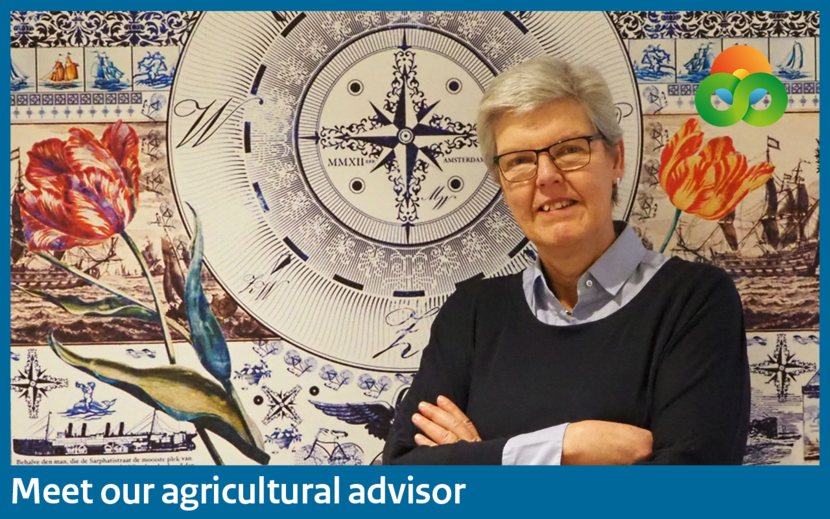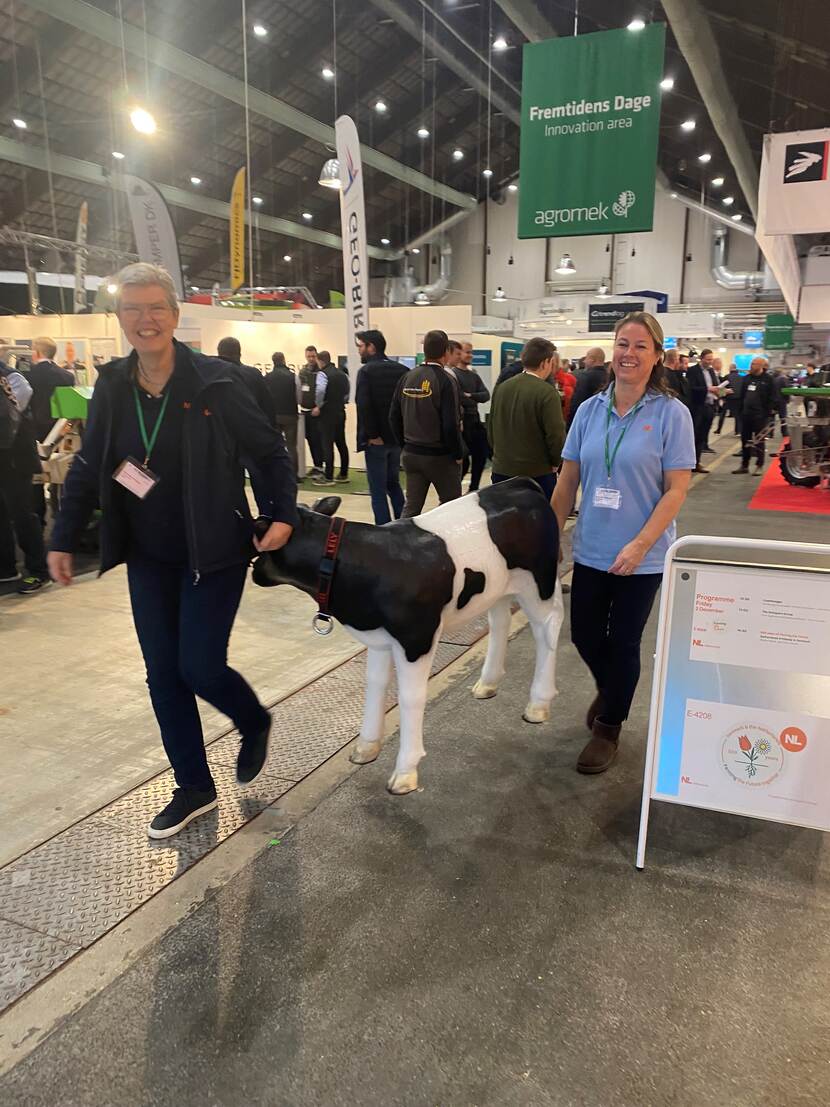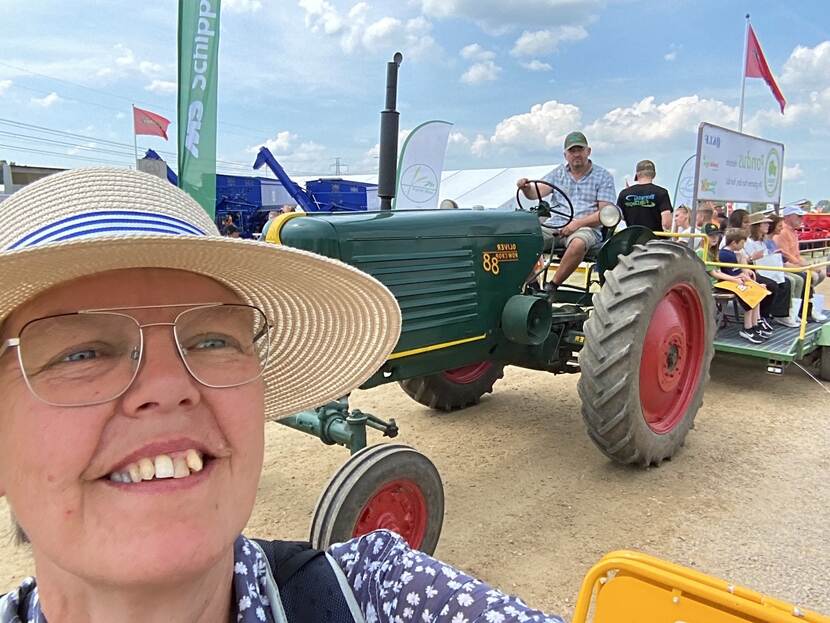Green transitions and AgTech cooperation in Denmark
The Danish government has reached an agreement with farmers and nature organizations to reduce agricultural climate emissions. In addition, 15 percent of agricultural land is to be converted into pasture or forest area. In response to the geopolitical situation in Europe, Sweden and Norway are striving to become more self-sufficient in food production. These are turbulent times, as Scandinavia is taking the lead in the green transition, says Agricultural Advisor Renske Nijland, stationed at the Dutch Embassy in Copenhagen and working the longest in this role within the Netherlands Agricultural Network (LAN).

Renske Nijland has been living in Denmark since 1987, after she finished her University degree in International Relations. She currently resides in the countryside south of Copenhagen with her Danish husband and thoroughly enjoys life there. 'We are surrounded by nature,' she says, 'which allows me to get out for a walk or bicycle ride quickly, whenever I have the time. Am I missing the Netherlands? No, not really. The Danes are pleasant people to deal with and Denmark is my home.'
Can you tell us a bit more about your work as an agricultural advisor?
The LAN team in Copenhagen comprises three members: Agricultural Counsellor Kirsten Peeters, Management Assistant Chantal van der Wulp and myself. Our working area not only covers Denmark but also includes Sweden and Norway. For that reason, we work closely together with the embassies in those countries and we travel often for conferences, fairs and meetings.

I am the information detective of the team. My understanding of the Scandinavian languages enables me to follow local news, social media, and press releases, as well as grasp the political context. I advise my colleagues at the Dutch Ministry on how to strategically cooperate with the Scandinavian countries on Dutch priorities, such as innovation, manure and organic farming. I also handle most trade inquiries and some policy requests from the Netherlands. For example: “Can I export my biscuits to Norway, can you help me find importers and how much import duty would I have to pay?”, but also “what are the animal welfare regulations for sea lions in the circus in Sweden?” Each day presents a new challenge in information gathering!
The network I have built over the years is diverse and influential. It is an advantage that I am a constant factor for the Netherlands in this region. For instance, usually I am the only international guest invited to the yearly conference for the Danish agricultural sector, because on the one hand I am part of this Danish network and on the other hand I bring and refer to Dutch expertise.
How do you work together as a LAN team?
After having worked mostly independent for many years, since 2023 I am part of a Copenhagen based LAN team again. Together with Chantal, we are the organizational memory of the department. We are part of the permanent staff, while the position of agricultural counsellor changes every few years. We have the practical information and local network while Kirsten has the fresh Dutch perspective and diplomatic skills, which allows her to prioritize and make sure we deliver.
Take, for example, the innovation study tour on data-driven AgTech (agricultural technology) which we are organizing end of June for Dutch companies with an interest in Denmark and Sweden. While Chantal takes care of the administration, Kirsten is in contact with the Dutch Ministry concerning the focus of the tour. I collect relevant information and contact persons and institutions to visit based on my network. Of course, we also work together with others, such as colleagues at the Embassy and the Netherlands Enterprise Agency (RVO) in the Netherlands. Our tasks overlap, and with good communication, we are able to create a great program as a team that benefits everyone.

Nitrogen is a hot topic in the Netherlands. What is that like in Scandinavia?
Manure was and is a priority, or rather nutrient leakage is. Manure in itself is no problem… in the right concentration at the right place and time it is of great value. I have been monitoring developments in the region for over 35 years.
When I started working at the Embassy, the Danish media focused on lobster dying in large numbers in the Kattegat, due to lack of oxygen. This was, already then, traced back to nutrient leakage from agricultural land. Action plans were set in motion to diminish this effect, and I have been reporting about them ever since.
Which recent actions plans have been taken in this area?
A striking recent development is the agreement that the Danish government has signed with farmers and nature organizations to reduce CO2 emissions and improve water quality, with one of the goals being the reduction of nitrate leaching annually by almost 14,000 tons by 2027. The incentive is the CO2 tax on carbon emissions which will take effect in 2030.
To support the farmers, there will be a buy-out program on a voluntary basis. Almost 6 billion euros will be made available to buy up agricultural land or to turn fields into forest and nature in consultation with farmers. Denmark is one of the most cultivated countries in the world: almost two-thirds of the total area is agricultural land. At least 15 percent of this will be converted into forest or nature area by 2045.

‘Scandinavia shows a way towards green transition, with initiatives like Denmark's collaboration to cut agricultural emissions’
Can you tell us about the process to reach these agreements and are there lessons to be learned for the Netherlands?
Already years ago agricultural and nature protection representatives realized that a win-win situation was possible. Marginal farmland, especially carbon rich, could be converted into excellent natural areas. Rewetting would also diminish CO2 emissions. The fact that this was a topic the parties could discuss made it easier to reach subsequent agreements on the larger plan. Parties felt the urgency of the climate and biodiversity crisis and saw a change to reroute agriculture into a more sustainable development gaining a license to produce, also in the future.
After the long process, an agreement was reached with solid support from the parties. The Danish Parliament approved it with broad majority, which will carry the plan into the future independently of more short term political interests. So far so good, but the implementation and practical work still has to be completed. For this, a specifically dedicated ministry has been formed: the Ministry of Green Transition. Although the Netherlands follows the Danish development with interest, the Dutch situation does not seem to, at this moment, allow for a similar approach.
Read more about this agreement here (in Dutch).
What other agriculture related topics or challenges are at stake?
Sustainable food system is a relevant topic, from plant-based production to animal welfare, and from sustainable fisheries to biodiversity. Also, the geopolitical situation in Europe is of influence. This has led to Sweden increasingly focusing on food security and wanting to be as self-sufficient as possible. They currently produce about 50% of their own food. The same is true for Norway, which produces only 40% of its own food.
‘Our AgTech mission showcases how Dutch and Scandinavian expertise can tackle shared challenges together’
Can you tell us more about the food security topic?
Part of their strategy is to increase demand for domestic products, for example by labeling them as such. In Sweden and Norway, consumers have a very positive attitude towards farmers. They prefer to eat local potatoes rather than organic potatoes from the Netherlands. This is something new exporters to this region should be aware of in their approach.
To become more self-sufficient, innovation is crucial. Just as in the Netherlands, there is a shortage of personnel in agriculture, so the solution must largely come from technology. Therefore, the initiative is to extend AgTech cooperation between the Netherlands and Scandinavia.

How can the Netherlands work together with Denmark, Sweden and Norway?
Last year, we went to Sweden with an innovation fact-finding mission. It showed that the Netherlands and Sweden are both technically at the forefront, but do different things. It means there is an opportunity for cooperation. In Denmark, we will look further into agricultural technology innovation and are planning a mission on this topic in June.
Regarding animal welfare, our ideas are also aligned, which means policy cooperation on EU level is a given. The past few years, we have also looked at the protein transition. Again, we are on the same page, and there is a fruitful exchange of ideas. Last year, we supported a large Dutch delegation of policy officers, businesses and NGO’s to Denmark on protein transition resulting in fruitful interactions and cooperation.
What tips do you have for Dutch stakeholders interested in Scandinavia?
Sustainability and climate are important and fully incorporated into everyday life. As a Dutch organization or company wanting to enter the Scandinavian market, you will have to make sure you have your sustainability policies in order. For example: you will need to have your data ready, if asked about side streams or recycling waste from production.

What is in the agenda 2025 of the LAN team?
Our agenda is set in our annual plan, based on the priorities of the Dutch Ministry aligned with the Scandinavian circumstances. Besides the usual work–supporting Dutch companies and following policy developments–we will focus on some specific topics this year, such as:
- How to attract more young farmers to the sector with Scandinavian initiatives. We are considering creating a challenge: may the best ideas win!
- In the run-up to the German organic trade fair Biofach in February, there will be a seminar in the Netherlands for organic entrepreneurs on January 23 which we will participate in. At the fair, Dutch companies will not only meet German contacts, but also Scandinavian buyers. Therefore, being prepared is key.
- Organize an innovation trip end of June focused on AgTech in Denmark and Sweden, as mentioned before. It includes visits to companies, knowledge centers and ‘farms-of-the-future’ and joining the open-air agricultural expo Borgeby near Malmö. We expect both startups and well-established Dutch AgTech companies to participate. Think of drones, sensors, barn equipment and field implements and software. The program will be organized in close cooperation with the companies and organisations which show an early interest to participate.
I encourage companies interested in the Danish and Swedish market to let me know as soon as possible! Further details will be published soon at the RVO website, but an early heads up will ensure that the program is best tailored to the interests of the participants.
What would you like to conclude this interview with?
Two things: I really appreciate the ease with which we complement each other in our team. However, that is not automatically given, we are dedicated to make it work.
Secondly, I enjoy the variety of my work, both in tasks and in topics. Agriculture, nature, food, fisheries… it never gets boring. Concluding that I really love my job, would be spot on!
Contact
- Email: kop-lvvn@minbuza.nl
- Telefoon: 0045 3370 7237
- LinkedIn: Netherlands Agricultural Network in Scandinavia